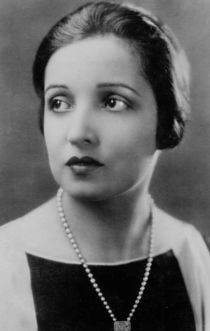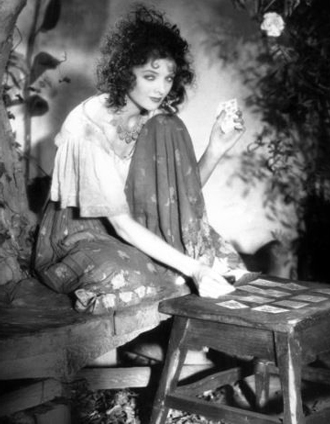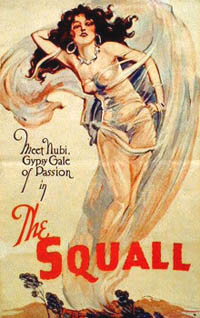
 |
|
|
|
The Warner Archive Collection's most significant contribution to film culture may very well be its focus on the earliest titles still intact in the Warner vault -- silent pictures, part-talkies and pictures from the year 1929, when all-talking pictures finally became the standard. Viewers sufficiently intrigued by the movie Singin' in the Rain to learn that the early-talkie gags in the picture were no exaggeration, may appreciate the conditions under which these films were shot. First National's The Squall is indeed a relic from the past, one for which the word 'dated' isn't strong enough. Yet it's the best example I've seen yet of the daunting limitations put on early talkie film production. 
The story is a rustic morality play. The Hungarian Lajos family lives in harmony. The husband Josef and his wife Maria (Richard Tucker & Alice Joyce) are happy in their marriage. They consent to the engagement of their son Paul (Carroll Nye) to local girl Irma (Loretta Young), even though he hasn't yet finished his schooling. The young couple is obviously deeply in love, and Irma will make a perfect daughter-in-law. The harmony extends to the kitchen, where the cook Lena (Zasu Pitts) has enough money saved to marry her sweetheart, also in Josef's employ. Then comes a storm and with it a gypsy caravan. Sultry young Nubi (Myrna Loy) begs for and is granted sanctuary in the house. But she excuses herself from most work to concentrate on her own agenda: seducing all the men in the Lajos household. The evil intruder has soon ruined three loving relationships. A holdover from ancient prejudices, Jean Bart's successful Broadway play sells every outdated idea in the book. Gypsies are strange tribal pagans that make pretty music but spread disaster wherever they go. Dark "foreign" women with names like Nubi are two-faced liars that destroy good homes with the evil of sex. The movie demonstrates that the vampish Nubi can seduce any man she wants with a mysterious hypnotic spell. Even the upstanding paterfamilias looks into her eyes and declares that he sees something there that compels him to take her in his arms. This bourgeois hogwash of a play blames the exotic Nubi for everything -- dad is innocent even when he kisses her in his own parlor. The handyman can't keep his hands off her. And the worthless son Paul ignores his fianceé, flunks his classes and steals money to give Nubi expensive jewels. It's all Nubi's fault. We're not told exactly what he and Nubi get up to "out in the woods", but I hope it was worth it. 
Even more outrageous is Maria's continued indulgence of her son Paul, an 'upstanding' youth who turns out to be made of jelly. Paul sneaks around, lies like a dog and steals from the helpless servants, but he's still Mama's good little boy. As the virtuous Hungarian wife, Maria does and says nothing when she sees her husband kissing the maid. The girl continues to wear her come-hither off-the shoulder peasant blouse and frizzy-wild head of hair. Come to think of it, the family has no reason to keep Nubi around. Her only job is to turn the lights out at night. We'd honestly expect Maria to attack the girl with a pitchfork. The major silent star Alice Joyce get higher billing but film fans will be impressed by the beauty of both Loretta Young and Myrna Loy when neither were yet top talent. Loy has the most fun as this most brazen of vamps. She apparently kept her career going with similar dusky, exotic man-killers until just a year or so before her her comedy hit The Thin Man. Carroll Nye is the same actor who played Scarlett O'Hara's second husband, in Gone with the Wind. Sneaking around and trying to evade his parents' questions, Paul doesn't come off very well. One needs to take into account quite a bit while watching The Squall, which presumably was filmed with the camera in a soundproof box. The actors may have been intimidated by the ongoing Talkie Terror, where "experts" decided who did or didn't have voices suitable for the microphones. They seem to have been heavily coached by diction experts and told to say everything as clearly as possible. Every dialogue line is exclaimed, as opposed to acted; the players enunciate every word and avoid turning their heads while talking, presumably for fear of going off-mike. Nobody walks and talks at the same time. This of course reduces the actors to wax figures playing to a microphone, with everyone speaking as if talking to near-deaf Aunt Minnie over a long-distance phone line. No wonder most of the performances are ludicrous. Only Zasu Pitts seems unconcerned, either that or most of what she says is a declarative wail anyway. With all those pauses between dialogue lines, every statement seems to be milked for extra meaning or irony. 
Myrna Loy's Nubi is of course the center of all the fun. Her shifty-eyed vamp speaks in the Pidgin English preferred by savages of this theatrical vintage, whether from Borneo, Panama or Egypt. Nubi plays up to the heads of the household, throwing herself at their feet and acting innocent. But she handles the other men like a pro, deflecting the same question from both the handyman and Paul: "Is there anyone else? Do you love only me?" Although Nubi is a brazen opportunist, a catalyst that turns men into sex-mad animals, she unfairly takes the rap for a family in severe denial of its own faults. The Lajos men are considered too noble to be guilty of anything. Now that we have access to more late-period silent films, The Squall demonstrates what a step backward early talkies were from something like Von Sternberg's Docks of New York. The silent cinema had found its own language for creating atmosphere, with moving cameras, elaborate visual effects and subtle acting that conveyed emotions on a physical level. The early-talkie camera restrictions, the reliance on dialogue to do everything and the influx of theatrical talent just threw away an entire visual language. The talkies wouldn't come into their own until the new voices began to reflect the way people actually talked, with interesting regional dialects: James Cagney is a perfect example. You notice I haven't touted The Squall as a 'camp' classic that's "unintentionally funny" ... that reaction's a little too easy and unfair. Ms. Loy's vamp act is actually very good considering the limitations, which include being unable to do anything sensual beyond ruffle her victim's hair and push her face close to his -- no nudity, no hints of funny business. When they're off camera we don't know if Nubi and her conquests are doing the deed or playing jackstraws. The production is stagey and Alexander Korda's direction has no surprises, but the special effects are quite good. For shots of the gypsy caravan coming and going, the studio uses mechanical wagon miniatures with little oxen that bob their heads up and down -- it's very amusing. And one shot shows a matted (silhouetted?) live-action figure stepping into a miniature setting to cross a bridge. The storm clouds matted in to represent the 'squall' are dramatic as well. 
The filmmaker who really nails the reactionary absurdity of this show is Luis Buñuel. His wickedly satirical Mexican film Susana (1951) presents an almost identical middle class (read: rich) Mexican family invaded by a devious minx. Stuck in a filthy, insect-ridden prison, Susana prays to God, and in response the rain frees her from her cell. Appealing to the mercy of the house, Susana seduces the brawny foreman, the wayward son and the rigid father. But Buñuel finishes the job in style: with her treachery uncovered just before she can become the new mistress of the house, Susana is dragged away screaming by the Federales. She goes back to the hellhole and the family heals as if the nightmare ever happened -- it was all that witch Susana's fault. Buñuel's backhanded moral forces us to realize that Susana's only choice is between Hell on Earth and stealing a Place in the Sun. But in The Squall we're supposed to laugh in triumph as poor dumb Nubi is forced back into slavery to a Gypsy King. Are Nubi and Susana "Evil" beings committed to disrupting the social order, or are they just fighting for life using the only weapons they have, lies and sex? 
The Warner Archive Collection DVD-R of The Squall is a fine copy of this interesting show from the beginning of the talking screen. The picture quality is quite good. The film is intact and the audio (originally sound-on-disc Vitaphone) has survived in good condition -- little hiss, high audibility. The sound mixing is also smoother than one would expect. It looks as if First National/Warners, in making sound-on-film prints of their early Vitaphone talkies, contact-printed the negatives without resizing the original Full Silent Aperture image to the slightly smaller new Academy standard. This results in the left extreme of the frame being slightly tighter, as the new soundtrack covers that area. Heads are very tight to the top frame line, because the Academy went from a narrow frame line to a much thicker one. These movies were soon retired from most TV showings because old sets cropped the pictures even further, often chopping off actors' heads. There are no other extras. Snooping around the IMDB reveals interesting facts about the actors. The young Loretta Young and Myrna Loy were obvious talents for future exploitation. The now forgotten Alice Joyce had been in pictures from 1910 (!) but her career didn't proceed much farther into the sound era. I can see Ms. Joyce regarding the tyrannical microphone and thinking, "Why am I putting up with this?"
On a scale of Excellent, Good, Fair, and Poor,
The Squall rates:
Reviews on the Savant main site have additional credits information and are often updated and annotated with reader input and graphics. Also, don't forget the 2010 Savant Wish List. T'was Ever Thus.
Review Staff | About DVD Talk | Newsletter Subscribe | Join DVD Talk Forum |
| ||||||||||||||||||